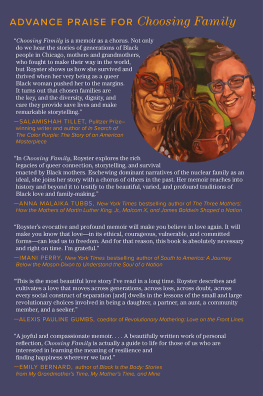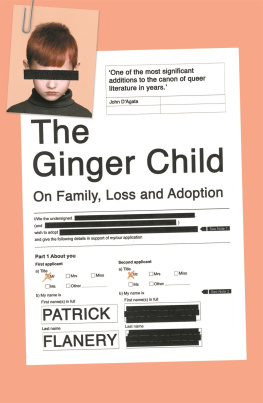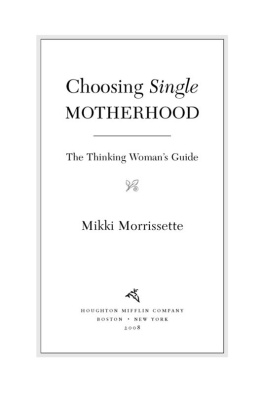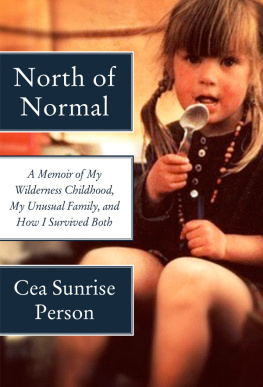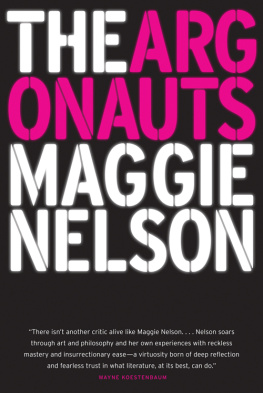Contents
Guide
Page List
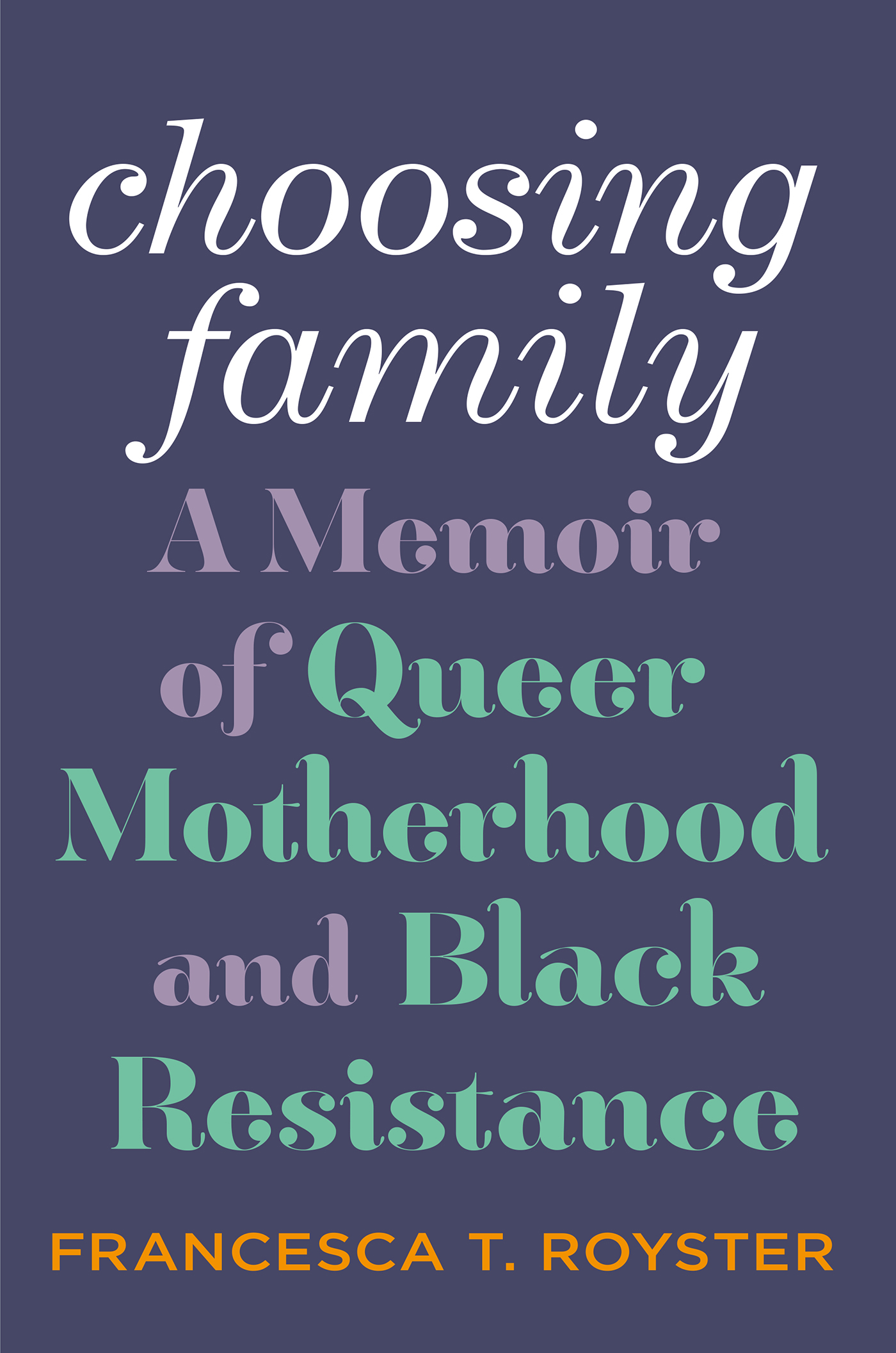
MORE ADVANCE PRAISE FOR
CHOOSING FAMILY
[An] affecting memoir.... Insightful and reflective, this is a moving tribute to the power of chosen family. Publishers Weekly
In this powerful, incisive, and deeply personal memoir, Royster explores the beauty and challenges of creating family and the tenets of community necessary to sustain and nurture said family. With precision and heart-wrenching details, she calls into question everything one thinks about generational wisdom, queerness, partnering, parenting, and the consummate fear and the proportional courage that shadow it all. I savored every word. Cheryl L. West, award-winning playwright of Fannie, Pullman Porter Blues, Before It Hits Home, and Jar the Floor
In her memoir, Choosing Family, Royster places herself in conversation with both familial ancestors and intellectual muses in order to make an honest reckoning of her own experiences as a queer Black woman and an adoptive parent. Aptly named, this book highlights the power of choice, particularly when it comes to building family and community of all kinds, and making meaning that serves the future while honoring the past. Nishta J. Mehra, author of Brown White Black: An American Family at the Intersection of Race, Gender, Sexuality, and Religion
This is the most beautiful love story Ive read in a long time. Maybe ever. Royster describes and cultivates a love that moves across generations, across loss, across doubt, across every social construct of separation. This is an intimate, vulnerable, and wise ceremony. Royster dwells in the lessons of the small and large revolutionary choices involved in being a daughter, a partner, an aunt, a community member, and a seeker. I held it close while I read it. It hasnt let me go. This book is offering me new lessons on my own love stories. This is a story that can love each and every one of us, if we let it. This is a story that can offer us a more loving world, if we let it. Let it be so. Alexis Pauline Gumbs, coeditor of Revolutionary Mothering: Love on the Front Lines
Choosing Family is a joyful and compassionate memoir of the life of an extraordinary queer Black woman reckoning with her past as she creates a family of her own. But this is only part of the story that Royster captures in this deeply affecting narrative, which is, finally, a portrait of a world full of meaningful and lasting connections between individuals, living and dead, and the various cultures that produced them. A beautifully written work of personal reflection, Choosing Family is actually a guide to life for those of us who are interested in learning the meaning of resilience and finding happiness wherever we land. Beneath the many captivating scenes and magical moments in this book is a river of kindness that fuels Roysters perspective on the world and makes Choosing Family a delightful, warm, and sacred space in which any reader will find comfort, acceptance, and inspiration. Emily Bernard, author of Black Is the Body: Stories from My Grandmothers Time, My Mothers Time, and Mine

It is an act of love to participate in the resistance work of child-raising.
Alexis Pauline Gumbs, m/other ourselves: A Black queer feminist genealogy for radical mothering
[We] must be as strong as our ancestors, and twice as fierce!
Fierce Love, a 1991 play by the Pomo Afro Homos, Djola Bernard Branner, Brian Freeman, and Eric Gupton
This book is dedicated to my family, blood and chosen.
To my love, Annie
And to Cece:
You are our ancestors wildest dreams.
And in memory of my mother,
Sandra H. Royster
(19421999)
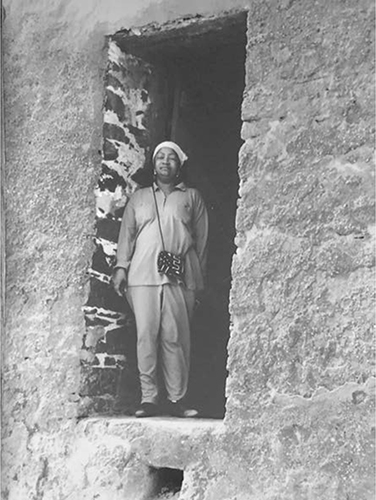
Mom with the ancestors.
Sandy Royster at the Door of No Return, Gorree Island, 1990s.
Photographer unknown.
PART I
BLUEPRINTS FOR A QUEER FAMILY
PART II
THE THREE OF US AND MORE
PART III
GIRL MEETS WORLD
SUMMER 2016
PART IV
CECES JOURNEY
DREAMING THE FUTURE
PART V
RECKONINGS
ALL YOU CHANGE CHANGES YOU
CONTENTS
1
EVOCATION
A Gathering of Mothers
Dear Mothers, help us make a way out of no way.
In this time of waiting, I reached beyond death to call on the mothers of my family, those shapers of my history who embraced the gathering of kin as their lifes work, often against the odds of laws and propriety. These mothers, sometimes bigger than life, sometimes movingly human, have taught me how to bring my whole self, even with my flaws, to the work of loving and making a home. From these women I learned an ethos of family that includes chosen as well as blood relations, thats both fierce and vulnerableand sometimes a little wily. We needed these mothers as we waited for an answer.
I have been without church, without a practice; after a childhood of on-again, off-again visits to the Catholic and Baptist churches of my family and friends, I have become more of a do-it-yourselfer, drawn most to the West African conception of ancestors who shape everyday life. When I call on my mothers, one part in memory, one part in prayer, I find affinity with the Yoruba religious tradition of the orishas, the spiritual deities who are intermediaries between the human and the divine. The orishas are associated with aspects of nature, like rivers and fire, and have both virtues and flaws that help keep them relatable to human worshipers. I find in these deities a blueprint for the deep spiritual presence that my mothers manifest for me now and for the passionate ways they cared for their families, struggled against racism, and lived out their passions in their own lifetimes. As with so many things in my life, there is no neat mold for me to follow. Ive had toand Ive chosen tocraft my own path. I dont fit the models that were given to me in childhood. There are pieces of those I still carry with me, but there is too much that I feel compelled to rejector which feels compelled to reject me.
In the shape of the orishas, I have found a world that mirrors and deepens my own. A world of hidden power and of female strength and open sexuality; a world that makes space for both peace and rage. I see the orishas everywhere: shaping my favorite films, like Daughters of the Dust and Black Panther, in the music of John Coltrane and the trickster scowl of Grace Jones, in Black folktales and in my favorite novels by Zora Neale Hurston and Toni Morrison. And in her book Ezilis Mirrors: Imagining Black Queer Genders, Black feminist critic Omiseeke Natasha Tinsley writes evocatively of Ezili, the pantheon of water spirits of Haitian Vodou, that for many models gender and sexual nonconformity as expressed through all kinds of creative outlets, from the insurgent spirit beyond Haitis first slave uprisings to Beyoncs

